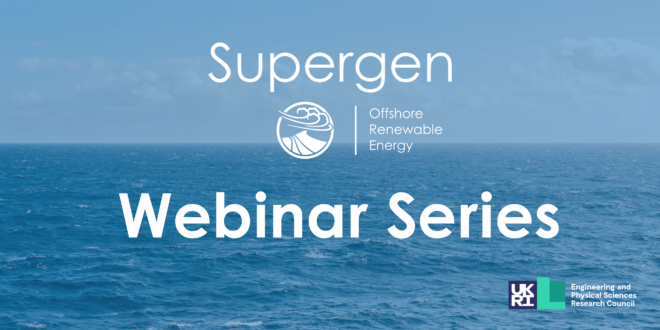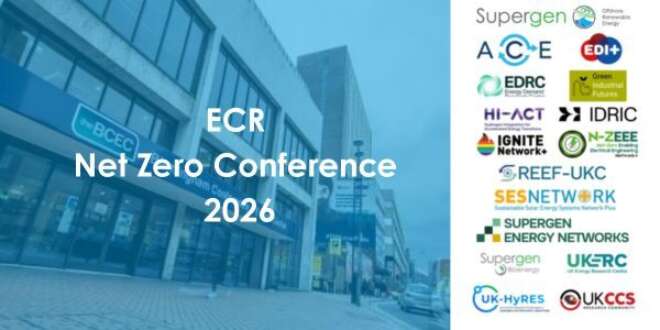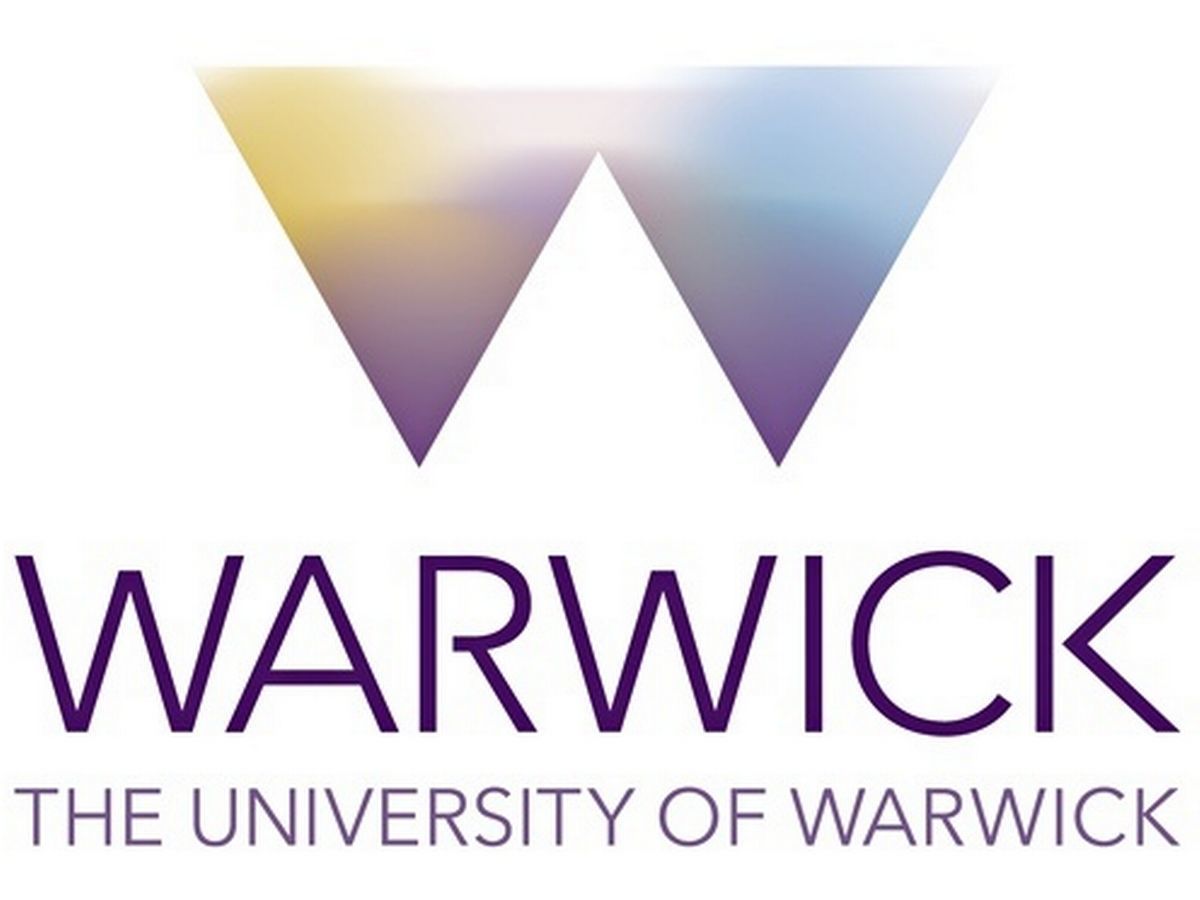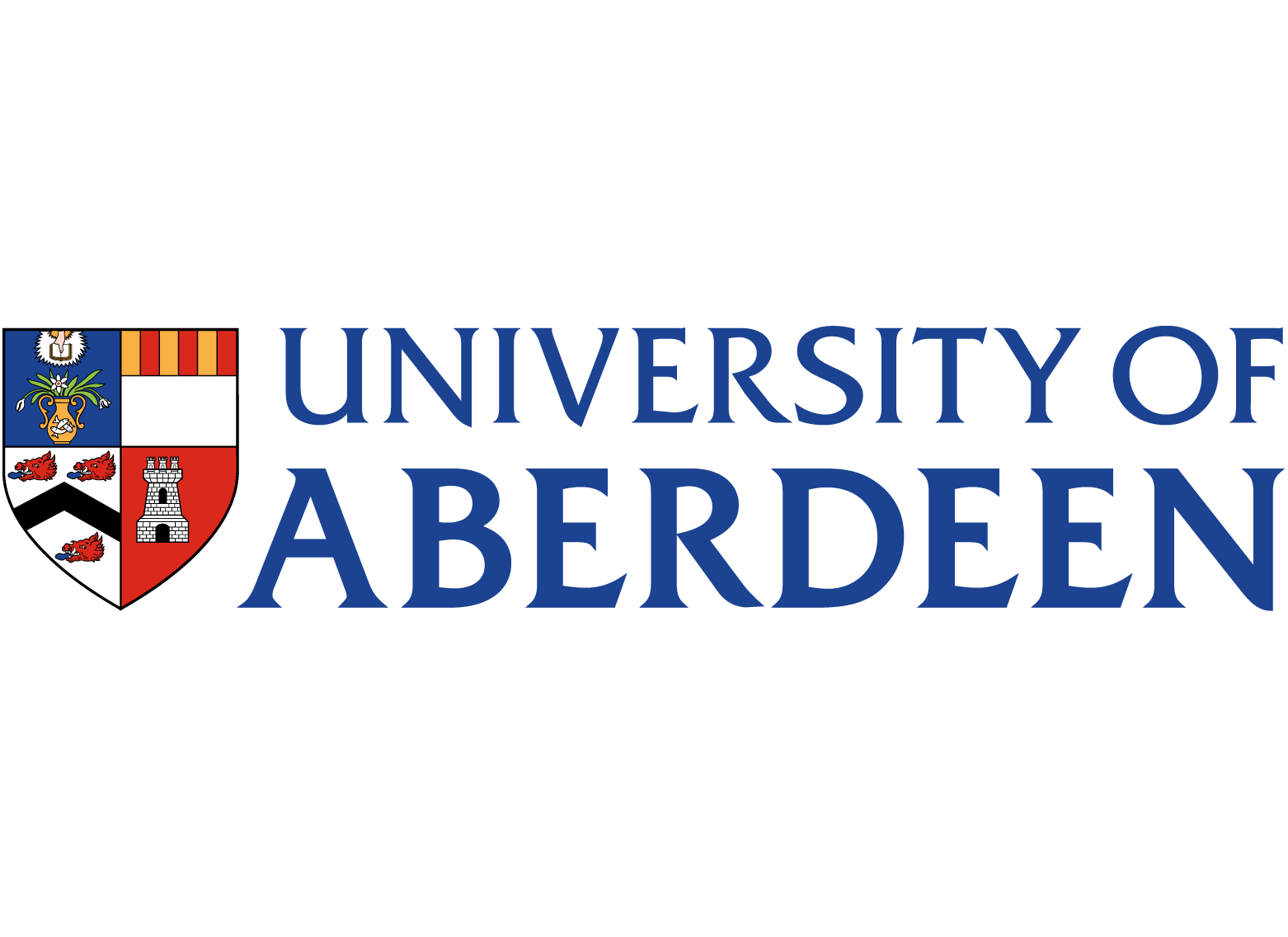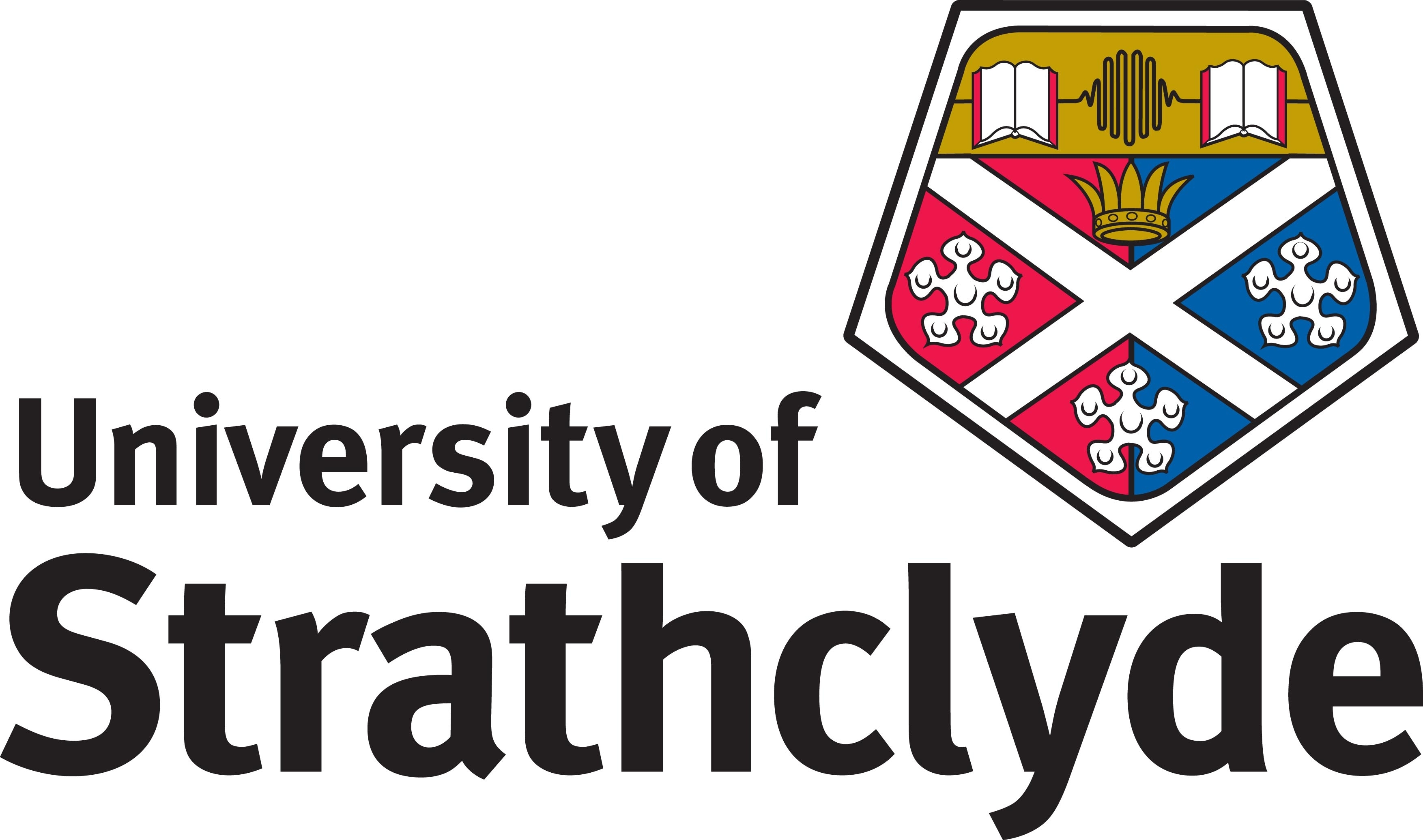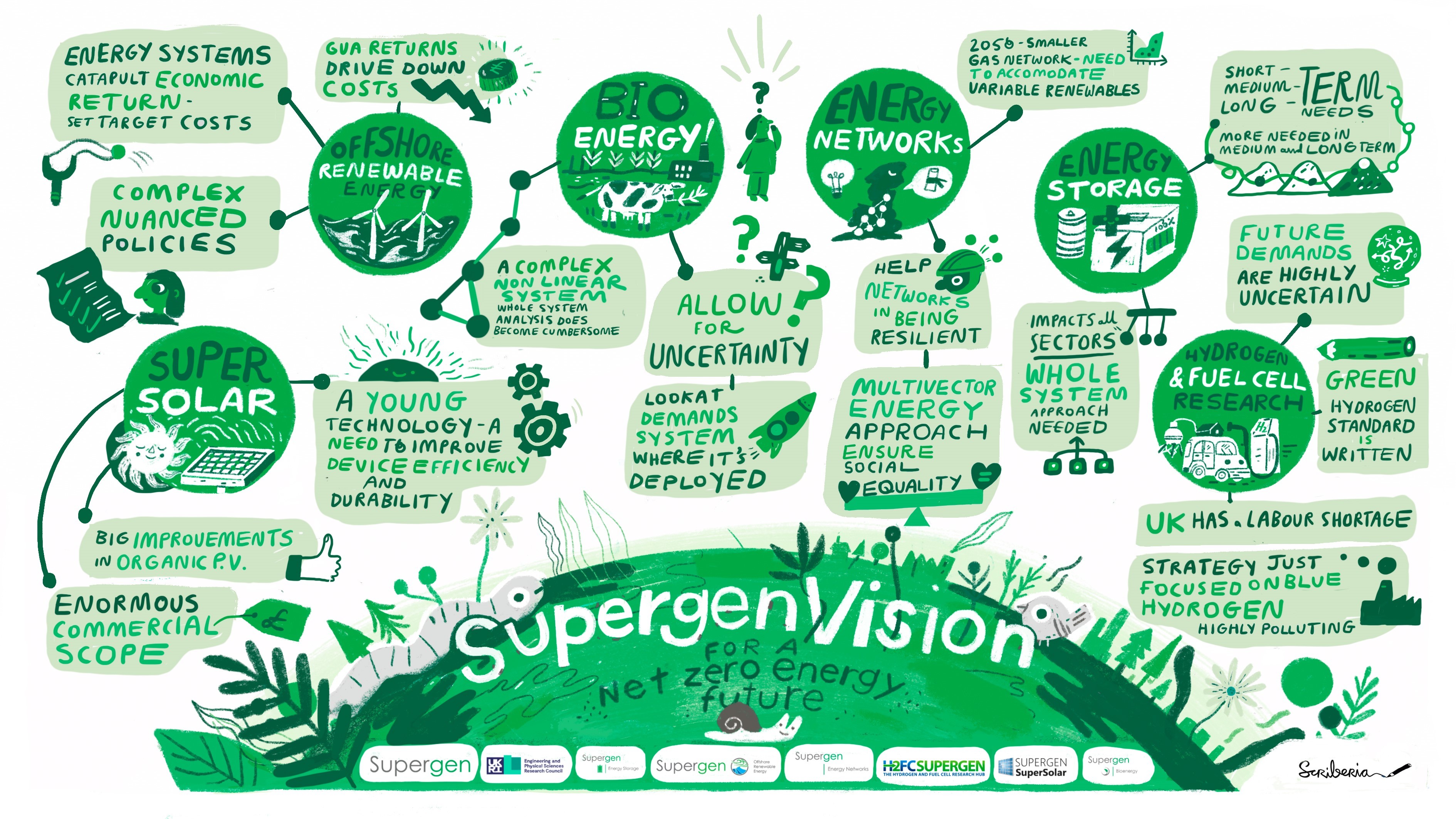
During the 21st United Nations Climate Change Conference of the Parties (COP21) hosted in Paris during 2015, world leaders committed to keeping global temperature level rise well below 2C above pre-industrial levels, whilst pursuing strategies to limit warming to 1.5C. This year COP26 is being hosted by the UK, in partnership with Italy, providing the UK with an opportunity to deliver climate leadership on the global stage, following on from writing targets for net zero emissions into law in 2019.
The Supergen programme commands a large share of the UK Research and Innovation energy programme funding, covering different sectors such as solar, bioenergy, offshore renewables, hydrogen, energy networks and energy storage, and is well positioned to interact with stakeholders to provide comprehensive scientific information to support policymaking in the run up to COP26.
Ahead of COP26, the Supergen Hubs hosted a Supergen Net Zero Conference during 1-3 September, exploring the role of energy research in the pathway to net zero. You can watch all the recordings from the sessions below, and visit the other Supergen Programme websites to find out more about them.
Wednesday 1 September 2021
Early Career Researcher Forum
Organised by a cross-Hub group of Supergen Early Career Researchers (ECR), the ECR Forum is split into three sessions, each beginning with a series of flash talks and then entering into a panel discussion. The three sessions covered greening the economy and society, the future of sustainable transport, and the global transition to clean energy.
ECR briefing paper: Strategic priorities for net zero energy research – a perspective from Supergen early career researchers
This briefing paper summarises the outcomes of the flash talk presentations and discussions presented during the Early Career Researcher (ECR) Forum, and puts forward the current thinking on challenges and opportunities in achieving net zero, from the perspective of ECRs working within energy research. Download the briefing paper
Equality, Diversity and Inclusion in Energy Research
Led by the Energy Networks Hub, Dr Sara Walker introduced the cross-Hub EDI report she has authored. We will then heard from an array of speakers who presented on EDI interventions which they had undertaken, followed by a Q&A.
Thursday 2 September 2021
Keynote: Dr Alan Whitehead MP
Dr Alan Whitehead MP, Shadow Minister for Business, Energy and Industrial Strategy, delivered a keynote speech on the challenge of delivering net zero, followed by a short Q&A.
The importance of international collaboration in sustainable power generation and supply
Led by the Supergen ORE Hub, Professor Deborah Greaves OBE was joined by presenters who introduced international projects undertaken in collaboration with the UK, providing insights into the challenges and opportunities of working across borders.
Collaborating for net zero, an industry perspective
Led by the Energy Storage Network+, Professor Yulong Ding was joined by speakers from Supergen industrial partners who presented on their activities and connections with research, which led into a panel discussion that explored potential for future industry-academia partnerships.
Friday 3 September 2021
Supergen Offshore Renewable Energy Hub session
The Supergen ORE Hub showcase was led by Professor Deborah Greaves OBE, who was joined by other Co-Directors of the Hub including Professor Beth Scott (University of Aberdeen), Professor Richard Willden (University of Oxford), Feargal Brennan (University of Strathclyde), Xiaowei Zhao (University of Warwick) and Byron Byrne (University of Oxford). This session explored the challenges and opportunities of offshore renewable energy technologies in delivering net zero, as defined in the interactive Research Landscape.
Policy implications of Supergen research ahead of COP26
Led by the Bioenergy Hub, this session began with an opening speech from Dr David Joffe, Head of Carbon Budgets at the Climate Change Committee. We then heard from each Supergen Hub about their policy work and key messages, before entering into a cross-cutting panel discussion on the implications for policymakers of energy research delivering net zero, chaired by Patricia Thornley.
About the Supergen Programme
The EPSRC Supergen programme was set up in 2001 to deliver sustained and coordinated research on Sustainable PowER GENeration and supply, focusing on several key research areas, including bioenergy; energy networks; energy storage; fuel cells; hydrogen and other vectors; marine, wave and tidal; solar technology; and wind power.
- The Supergen ORE Hub is a £9 Million Engineering and Physical Sciences Research Council (EPSRC) funded project. Led by Prof. Deborah Greaves OBE, Head of School of Engineering, Computing and Mathematics at the University of Plymouth, the Hub is a consortium of Universities researching Offshore Renewable Energy which also includes University of Aberdeen, University of Edinburgh, University of Exeter, University of Hull, University of Manchester, University of Oxford, University of Southampton, University of Strathclyde and University of Warwick. The Supergen ORE Hub brings together and builds on the work of the former Wind and Marine Supergen Hubs following consultation with the research community. The new hub looks for synergies between wind, wave and tidal technologies as well as building on current research in each area.
- The Supergen Bioenergy Hub works with academia, industry, government and societal stakeholders to develop sustainable bioenergy systems that support the UK’s transition to an affordable, resilient, low-carbon energy future. The Hub is funded jointly by the Engineering and Physical Sciences Research Council (EPSRC) and the Biotechnology and Biological Sciences Research Council (BBSRC) and is part of the wider Supergen Programme.
- The Supergen Energy Networks Hub brings together the vibrant and diverse energy networks community to gain a deeper understanding of the interactions and inter-dependencies of energy networks. Led by Hub Director, Professor Phil Taylor from Bristol University, the Hub integrates a wide range of industrial and academic partners with other energy network stakeholders. The Hub’s research is carried out by a consortium of Universities: Newcastle, Bristol, Manchester, Cardiff, Bath and Leeds. The research addresses the challenges of technology, policy, data, markets and risk for energy networks.
- The Supergen Energy Storage Network+ is an integrated, forward-looking platform that supports, nurtures the expertise of the energy storage community, disseminating it through academia, industry, and policy, at a particularly important time when decisions on future funding and research strategy are still being resolved. The Supergen Network+ has secured £1M in funding from the Engineering and Physical Sciences Research Council and has a core partnership of 19 investigators from 12 UK institutions, all focused on the wider advancement, exchange and dissemination of energy storage expertise. A further 100 organisations from the UK and abroad have pledged their support for the network. The Supergen Storage Network+ is led by Professor Yulong Ding (University of Birmingham). Dr Antzela Fivga manages the Supergen Network+, leading on project management and day-to-day operations.
- The Supergen SuperSolar Hub started in May 2012 and has since successfully formed an inclusive solar community that links research carried out by universities and industry. Led by Loughborough University’s Centre for Renewable Energy Systems Technology (CREST) the Hub comprises the Universities of Bath, Cambridge, Imperial College, Liverpool, Oxford, Sheffield and Southampton and the Solar Fuels Network. SuperSolar is funded by the Engineering and Physical Sciences Research Council’s (EPSRC) RCUK energy programme. In 2018, the universities of Swansea and Warwick joined the core members.
- The Hydrogen and Fuel Cells (H2FC) Supergen Hub is funded by the Research Councils UK Energy Programme, as part of the government’s Sustainable Power Generation and Supply initiative. It was set up in 2012 to address the key challenges facing the hydrogen and fuel cell sector as it strives to provide cost competitive, low carbon technologies in a more secure UK energy landscape.
